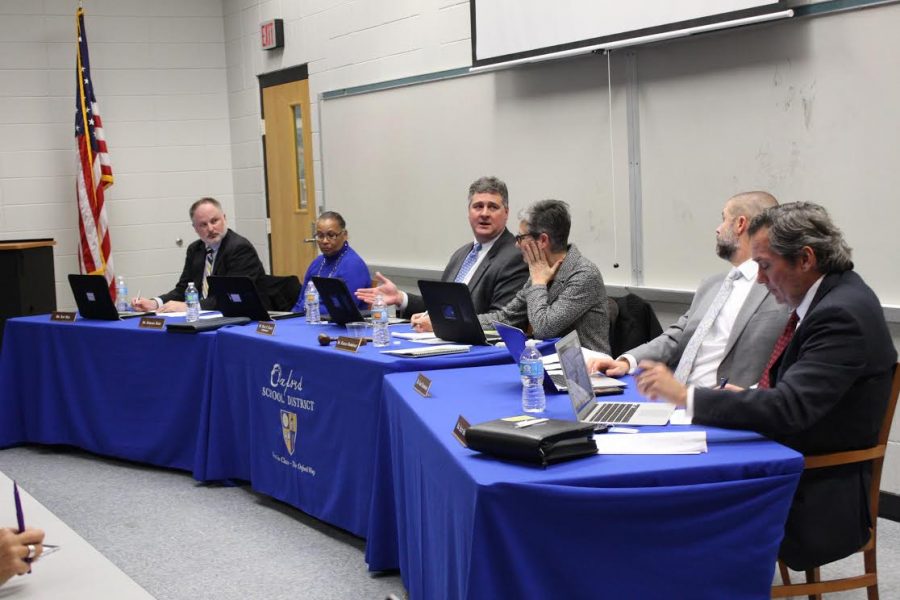Legislators differ over effects of newly proposed education funding formula
Superintendent Brian Harvey speaks to the school board on Jan. 23 about the impact the EdBuild formula could have on the Oxford School District.
January 30, 2017
Mississippi legislators are considering a new approach to education funding. EdBuild, an education consultant based in New Jersey, advanced a new funding formula before the legislature on Jan. 16.
The state hired EdBuild to review the current formula, the Mississippi Adequate Education Program (MAEP), and recommend an updated formula.
Representative Jay Hughes of Oxford faults the hiring process for lack of transparency. He and other legislators learned of the EdBuild contract through news reports rather than through the normal legislative process.
Prior to the EdBuild presentation, Hughes observed, “I find it very unfortunate, bordering on nefarious, that an out-of-state company is going to come tell us how to do education funding in Mississippi, yet they won’t share that information in advance to allow us to be informed and ask intelligent questions at the presentation.”
Opinions differ dramatically on the value of the newly presented funding formula.
The current formula, MAEP, starts with a base student cost which is multiplied by the average daily attendance. Also factored in is a mandated weight for students receiving free and reduced lunch and add-ons for vocational education, special education, and transportation, among other factors. Local contributions are designed to contribute 27% of funding, with the state providing 73%. This formula has only been fully funded twice in its 20 years of existence.
“While we may do some adjustments to the MAEP, I think that we simply have to try it before we throw it away,” Hughes said. “It’s like having a 20-year-old car and it doesn’t have enough gas in it and you claim it won’t go as far as it’s supposed to go. Well the car’s not broken. The fact that you’re not funding it enough is what’s broken. The formula isn’t broken. The legislature is broken because it’s not funding the formula. So it’s not fair to say the formula’s a failure, because we don’t know. We’ve never put enough gas in it to run it.”
Tollison noted that recession and budgeting constraints have led to the program’s underfunding.
The new EdBuild formula is based on weighted, or “student-centered,” funding which starts with a baseline cost for each student and then adds weights, or multipliers, based on the specific needs of individual students. According to the EdBuild report, students who would receive multipliers include English Language Learners (ELL), special needs students, gifted students, students in career and technical programs, and students in small or sparse districts.
“In 20 years since MAEP was created, states have been moving towards more student-based and technology has allowed us to do that,” Senator Gray Tollison said. “We have 490,000 students across the state and not all of them are the same.”
Tollison noted that new technology that did not exist when MAEP was created allows a student-centered formula to be more practical today.
“We need to recalibrate and use the latest models to properly or fairly disperse the money that we have for education,” he said.
Hughes fears that assigning a dollar amount to each individual student could be a precursor to the use of school vouchers in Mississippi.
“I completely believe in recognizing the fact that special needs students have higher costs, at-risk students take more money to educate,” Hughes said. “The troublesome part for me about assigning it specifically to the child is that it opens the door for private businesses to recruit that child and take that money with them. When the student leaves a school district and takes their money with them, it doesn’t necessarily mean it costs less to operate the school district.”
EdBuild’s report also asserts that Mississippi’s “27% rule” commits the state to providing 73% of funds, exceeding the national average of 46.7%. The report further suggests that the “27% rule” should be eliminated altogether and replaced with a rule that better suits their recommendations.
Hughes stated, in a live stream following the presentation, that eliminating the “27% rule” would lead to an increased tax burden on local communities.
“Think of what that’s going to do and how devastating that’s going to be to our perpetually poor and underperforming districts,” Hughes said. “It’s beautiful the way that they presented it today, but the reality is it means shifting tax responsibilities to the local level.”
The EdBuild formula’s impact on funding for Oxford School District is in dispute. Tollison stated that “hopefully Oxford would be more or less within the same range as it is now,” and noted that this is one of the issues they will be dealing with during the legislative session.
He added that the 27% rule of the MAEP formula creates inequity between poor and wealthy school districts.
“The wealthier districts will get wealthier and the poor districts will get poorer and that’s just the way it probably will remain, which is unfortunate,” Tollison said.
Hughes asserted that Oxford, along with Madison, Lee, Desoto, and Lowndes counties, would actually lose money due to the new formula.
“That’s big,” he said. “That’s a lot of schools.”
Oxford School Board President Marian Barksdale stated that the Oxford School District would likely receive less money due to the new formula.
“Oxford would likely be one of the districts getting less state money than we get now, even with the under-funded MAEP formula,” she said. “Our district may have some very tough decisions to make, starting with the upcoming budget cycle.”
In a school board meeting on Jan. 23, Harvey asserted that the Oxford School District could lose as much as $5.1 million of state funding if the EdBuild proposals are enacted.
“In theory, I can say those who have more probably should pay more, but that has an impact on our district and we will have to look at how that impact is measured,” Harvey said.
The tug-of-war over the EdBuild proposals is likely to continue during this legislative session.
“All of these things are going to be considered and debated during the legislative session,” Tollison said.














